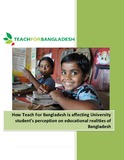| dc.contributor.advisor | Khan, Tahsan Rahman | |
| dc.contributor.author | Imam, Sarder Tawhid | |
| dc.date.accessioned | 2014-06-01T05:56:42Z | |
| dc.date.available | 2014-06-01T05:56:42Z | |
| dc.date.copyright | 2014 | |
| dc.date.issued | 2014-05-14 | |
| dc.identifier.other | ID 10104078 | |
| dc.identifier.uri | http://hdl.handle.net/10361/3250 | |
| dc.description | This internship report is submitted in a partial fulfillment of the requirements for the degree of Bachelor of Business Administration,2014. | en_US |
| dc.description | Cataloged from PDF version of Internship report. | |
| dc.description | Includes bibliographical references (page 37). | |
| dc.description.abstract | There is a large educational disparity that exists between the quality of education available to the higher and lower socioeconomic class. There are certain factors that perpetuate this disparity and one of those factors have been identified by the Teach For Bangladesh (TFB) model as being mindsets of the people. The theory of change model accordingly tries to reverse these perpetuating factors and this research tries to assess the extent to which Teach For Bangladesh has been successful in reversing the prevailing mindset factor. Using data from the past recruitment cycle of TFB, a survey questionnaire, study of literature, study of TFB’s strategic plan as well as an in-depth interview with Maimuna, CEO of TFB, this report evaluates the extent to which TFB has been successful in altering University students perception on educational realities of Bangladesh.
Study of literature, strategic plan of TFB and conversation with Maimuna identifies the mindsets of University students which are a factor contributing to the perpetuity of educational inequity. These factors include a lack of understanding of the enormity of the inequity that exists and hence the lack of urgency in solving the problem; teaching as a profession not aspired to and normalization of class division. These major mindsets are identified as barriers towards eradicating the problem of educational inequity and the TFB model aspires to change these mindsets by challenging these beliefs as its long term vision.
The process of altering mindsets is one that is very challenging and does not have a sure shot formula. It requires much thought and effort to truly change a rooted mindset of an individual, let alone an entire nation. With hopes of altering some deeply rooted mindsets surrounding education, TFB is tactfully choosing its recruitment messages. The recruitment strategies of TFB were studied and it was found that each strategy is successfully converting point of interest into registrations. The study of how effective recruitment strategies are at altering mindsets have shown that some alterations to knowledge base as well as some surface mindsets have begun changing among University students. Perception of University students surrounding teaching as a profession has also shown deviations among those students who have had interaction with TFB compared with those who have not. Analysis of the proportion of students that TFB has been able to reach revealed that more than half the sample has had some kind of interaction with TFB.
vi | P a g e
This is quite a large proportion given the short recruitment cycle of TFB this year. However, it is likely that this result is biased due to limitations of this study.
Maimuna, CEO of TFB hopes that within the next 5 years, the TFB model would have effectively started altering some of the deeply rooted mindsets that the model tries to address. This will only be possible once the TFB model starts to prove the mindsets wrong. This will happen once the inaugural Fellows of 2014 complete their 2-year Fellowship and begin transformational changes as change agents. This vision is estimated to have a time span of about 5 years. | en_US |
| dc.description.statementofresponsibility | Sarder Tawhid Imam | |
| dc.format.extent | 48 pages | |
| dc.language.iso | en | en_US |
| dc.publisher | BRAC University | en_US |
| dc.rights | BRAC University Internship reports are protected by copyright. They may be viewed from this source for any purpose, but reproduction or distribution in any format is prohibited without written permission. | |
| dc.subject | Business administration | en_US |
| dc.title | How Teach For Bangladesh is affecting University student’s perception on educational realities of Bangladesh | en_US |
| dc.type | Internship report | en_US |
| dc.contributor.department | BRAC Business School, BRAC University | |
| dc.description.degree | B. Business Administration | |

